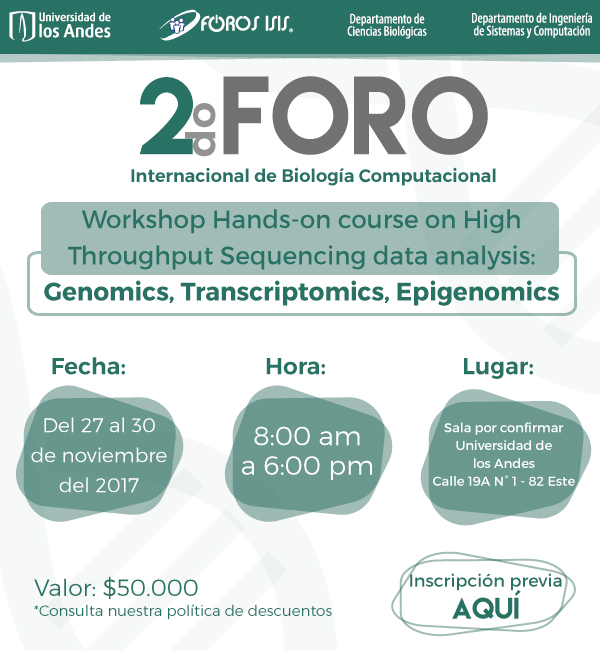2do Foro Internacional de Biología Computacional:
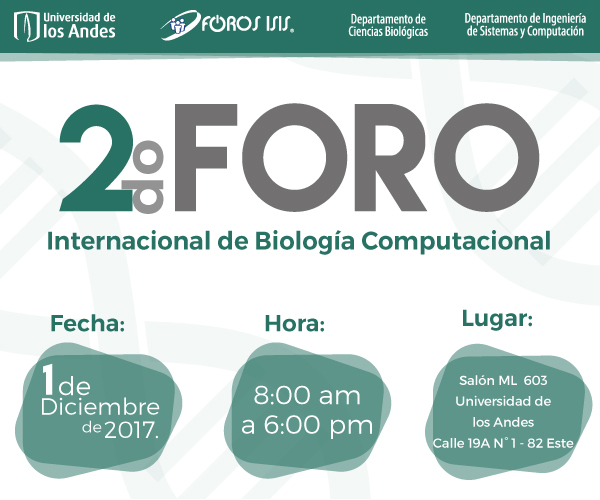
Apoyado por:

Objetivo
El mundo está de lleno en la nueva era de la Biología Computacional. Esta rama de la Biología y de las Ciencias Computacionales tiene un rol esencial en estudios a gran escala en temas que van desde la biodiversidad y la conservación hasta la solución de problemas en salud y agricultura que pueden significar la supervivencia humana en el mundo. Cada día se producen en el mundo millones de datos en el estudio de la Biología y la Medicina y gracias a los avances computacionales es ahora factible realizar análisis que hace unos años no habrían sido posibles.
La generación de estas cantidades masivas de datos es cada vez más económica y asequible. Sin embargo, el factor limitante ahora es el personal calificado y entrenado con la capacidad de analizar e interpretar los datos. Colombia debe posicionarse en esta área en la que tiene un alto potencial de ser competitiva. En este foro se discutirán tecnologías de punta en Biología Computacional, así como el rol que juegan para acelerar el desarrollo del país.
Igualmente, este foro es un día para que los estudiantes que se encuentran trabajando en el área de Biología Computacional y Bioinformática compartan sus trabajos con compañeros y profesores.
Fecha:
Viernes 1 de Diciembre 2017
Hora:
8:00 A.M. - 5:00 P.M.
Inscripción previa
Inscripciones abiertas hasta el 29 de noviembre. Cupos limitados
Lugar:
Salón ML 603
Universidad de los Andes. Edificio Mario Laserna.
*Cambios sin previo aviso
| Hora | Evento |
| 7:30 a.m. - 8:00 a.m. | Registro |
| 8:00 a.m. - 8:10 a.m. | Bienvenida |
| 8:10 a.m. - 9:00 a.m. | Keynote Marco Vignuzzi |
| 9:00 a.m. - 9:30 a.m. | Marco Cristancho: CABANA poject |
| 9:30 a.m. - 10:00 a.m. | Presentación trabajo grado (Camila Martinez) |
| 10:00 a.m. - 10:15 a.m. | Refrigerio |
| 10:15 a.m. - 12:00 p.m. | Charlas cortas (7 charlas) |
| 12:00 p.m. - 2:00 p.m. | Almuerzo libre |
| 2:00 p.m. - 2:30 p.m. | Charla Investigación (Claudia Chica) |
| 2:30 p.m. - 3:15 p.m. | Charlas Cortas (3 charlas) |
| 3:15 p.m. - 4:15 p.m. | Presentación trabajo grado (Manuela Vanegas) |
| 4:15 p.m. - 4:30 p.m. | Refrigerio |
| 4:30 p.m. - 6:00 p.m. | Sesión de posters |
| 6:00 p.m. - 8:00 p.m. | Cóctel/Posters |
Panelistas
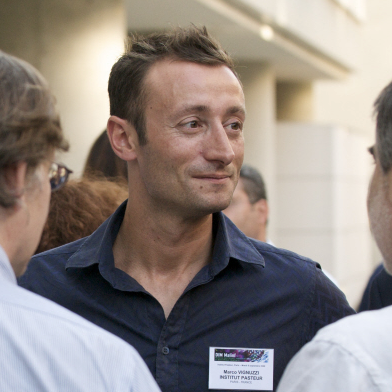
Marco Vignuzzi
Principal Investigator, of the Viral Populations and Pathogenesis Unit at Institut Pasteur. His lab tests concepts in evolution within the field of virology. They use cutting edge technologies and develop computational and experimental approaches to monitor, and potentially predict, virus evolution. This knowledge is then used in new vaccine and antiviral approaches.
Marco did his B.Sc. in Microbiology and Immunology at the McGill University in Montreal Canada. He then moved to France where he did hid Masters in Fundamental Virology at the University of Paris – Denis Diderot an his Ph.D., 2001 in Virology under the supervision of Sylvie van der Werf at the Institut Pasteur. After his Postdoct at the University of California, San Francisco in Raul Andino’s Lab he came back to the Institut Pasteur to lead his own lab.
Hands-on course on High Throughput Sequencing data analysis
Genomics, Transcriptomics, Epigenomics
Apoyado por:

¿A quién está dirigido?
Este taller teórico-práctico está dirigido a investigadores en ciencias biológicas, ciencias de la computación y áreas afines que estén interesados en el análisis de secuencias (que no requieren uso de la línea de comandos), las cuales explotan el poder computacional disponible en la nube, con servidores gratuitos o que pueden ser alquilados de acuerdo a las necesidades de los grupos de investigación.
¿Qué temáticas se tratarán?
The University of Los Andes and the Hub of Bioinformatics and Biostatistics of the C3BI (Center of Bioinformatics Biostatistics and Integrative Biology) at Institut Pasteur will organize this Hands-on course aimed at students/researchers that have produced High Throughput Sequencing (HTS) datasets and would like to learn how to get the most out of it. This course will provide a general introduction to the bioinformatic and statistical aspects of HTS data analysis, alternating theory and practice. The objective is to present the general concepts such as file formats, mapping of sequences, as well as, the specific procedures for each data type: DNA-Seq, RNA-Seq, Chip-Seq. An additional session will be devoted to the pathway and functional analysis for gene set issued from differential or other kind of analysis.
Knowledge of the basic Linux and R commands is highly recommended. Otherwise it is advisable to follow the introductory tutorial available on the course web page.
Agenda
*Cambios sin previo aviso
Day 1 (Introduction day)
| Hora | Actividad |
| 8:00 - 8:30 | Welcome / registration |
| 8:30 a.m - 12:30 p.m | Presentation of the course [T] Introduction to HTS/NGS technologies (Illumina, PacBio, NanoPore, etc.) [T] Some basics stats/probability concepts; Particularities of NGS sampling; underlying distributions, etc. [T] |
| 2:00 p.m - 6:00 p.m | Quality analysis (error and bias of different technologies, quality metrics in sequencing, etc) [T/P] Introduction to file formats (FASTA, SAM, BED, BAM...) [T/P] |
Day 2 (First HTS day)
| Hora | Actividad |
| 8:30 a.m - 12:30 p.m | Alignment and mapping and algorithms [T] Mapping against a reference - Mapping for cleaning contaminants [P] |
| 2:00 p.m - 6:00 p.m | Assembly [T/P] |
Day 3 (Second HTS day)
| Hora | Actividad |
| 8:30 a.m - 12:30 p.m | Transcriptomics: Expression quantification, differential analysis, splice variant analysis [T/P] |
| 2:00 p.m - 6:00 p.m | Epigenomics [T/P]: Quality control of IP enrichmnet, peak calling and introduction to differential analysis [T/P] |
Day 4 (Annotation and visualization day)
| Hora | Actividad |
| 8:30 a.m - 12:30 p.m | Pathway analysis and functional analysis [T/P] |
| 2:00 p.m - 6:00 p.m | Introduction to analysis in Galaxy Visualization of datasets in the genome browser IGV |
Costo
$50.000
Descuentos:
Estudiantes* y egresados - 10%: $ 45.000
Afiliados a SisAndes - 20%: $ 40.000
Descuentos para grupos mayores a 10 personas - 30%: $ 35.000
*Los estudiantes deben presentar carnet vigente para ingresar al taller
Fechay hora
Fecha: 27 de Noviembre - 30 de Noviembre
Hora: 8:00 a.m. a 5:00 p.m.
Lugar
Waira 2
Universidad de los Andes - Edificio Mario Laserna
Cra. 1 Este No. 19 A - 40
Postulación
Please fill the following form (in English) in order to apply for participation in the "Hands-on course on High Throughput Sequencing data analysis: Genomics, Transcriptomics, Epigenomics".
The selection will be confirmed on Monday November 20. The deadline for registration and payment is November 24. Remember that the course will be partially taught in English.
Instructores
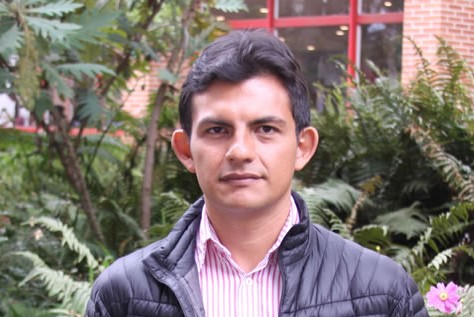
Alejandro Reyes Muñoz
Profesor Asociado de la Universidad de los Andes
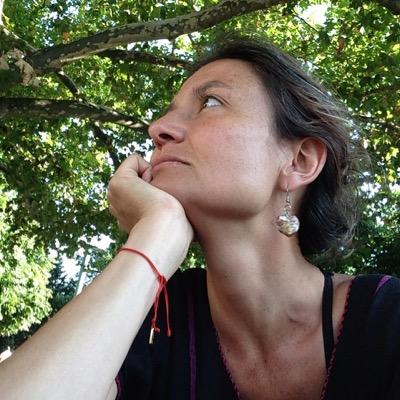
Claudia Chica
Senior Bioinformatician - C3BI - Institut Pasteur, Paris, Francia.
As a computational biologist I have been involved in various projects seeking to answer different biological questions. Those projects have allowed me to define my main research interest, namely the evolutionary study of the emergence, storage and modulation of information in biological systems assisted by computational methods.
During my research career I have acquired extensive experience in the analysis of sequence data at the DNA and protein level. I’m trained both in NGS bioinformatic protocols (ChIP-seq, ATAC-seq, RNA-seq, genome assembly) and fine detail sequence analysis. Most importantly, I have gained proficiency in the use of the statistical models that are at the basis of the quantitative analysis of low and high throughput sequence data.
Additionally, my experience as a lecturer and instructor has taught me that training researchers about the formal basis of bioinformatic methodologies is the key for a successful collaboration between wet and dry lab. Likewise, I have gained valuable skills by working within two international consortia (TARA Oceans project and TRANSNET): the ability to collaborate with multidisciplinary groups and to coordinate younger researchers.
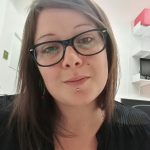
Rachel Legendre
Research Engineer - C3BI - Institut Pasteur, Paris, Francia
Rachel Legendre is a bioinformatics engineer. She completed her master degree in apprenticeship for two years at INRA in Jouy-en-Josas in the Genetic Animal department. She was involved in a project aiming at the detection and the expression analysis of micro-RNA involved in an equine disease.
In 2012, she joined the Genomic, Structure and Translation Team at Paris-Sud (Paris XI) university. She worked principally on Ribosome Profiling data analysis, a new technique that allows to identify the position of the ribosome on the mRNA at the nucleotide level.
Since november 2015, she joined the Bioinformatics and Biostatistics HUB at Pasteur Institute and she’s detached to the Biomics Pole in CITECH, where she is in charge of the bioinformatics analyses for Transcriptomic and Epigenetic Platform.




 FOROS ISIS
FOROS ISIS 